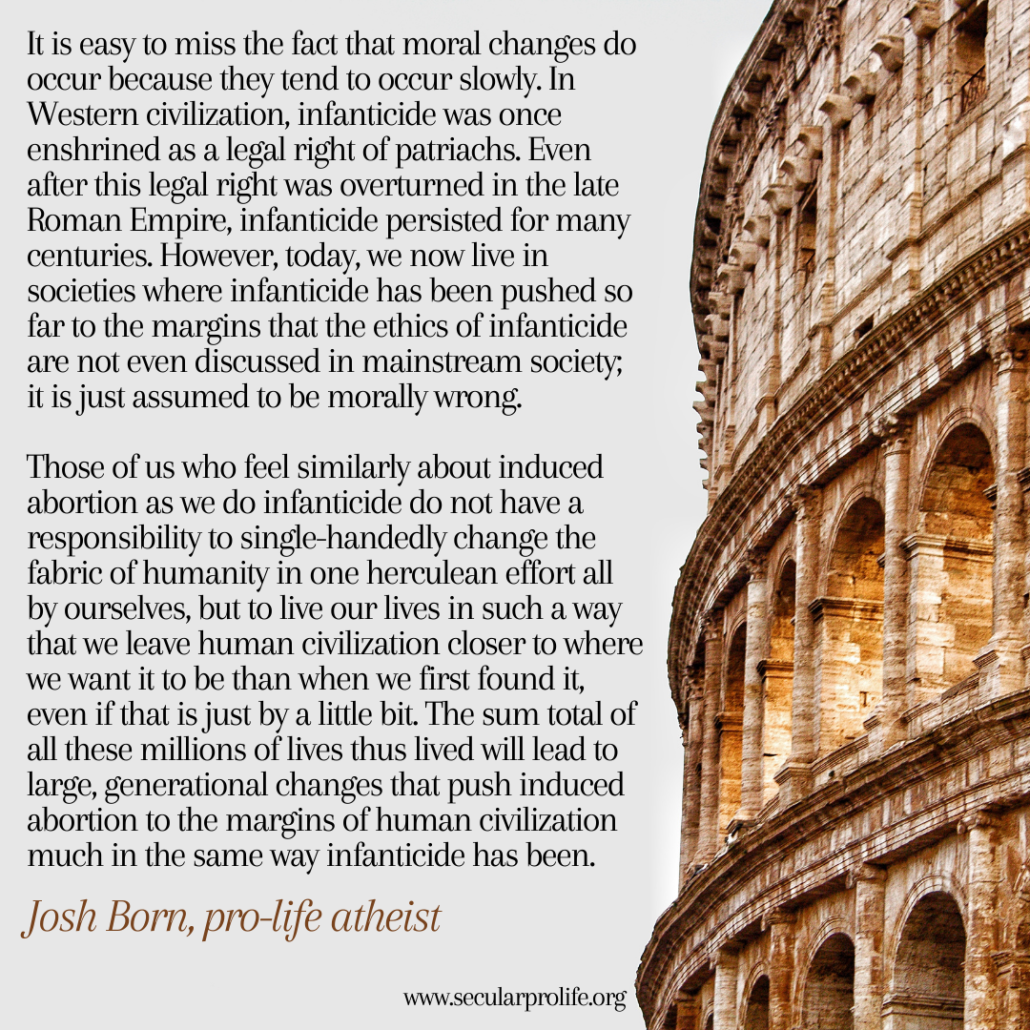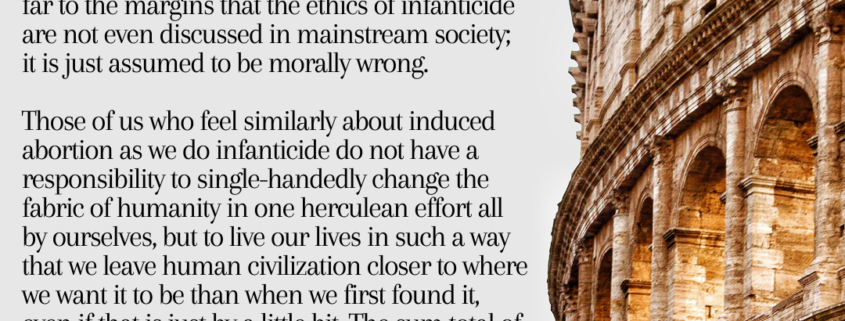Ask a Pro-Life Atheist: Josh Born
Once a month or so, the Secular Pro-Life blog features a short interview with a pro-life atheist. (See the full series of interviews here.) Although Secular Pro-Life is not exclusively for atheists, historically atheists have played a key role in the organization. As atheists become more prominent in the pro-life movement generally, we’re excited for the opportunity to share their stories. This month, we welcome pro-life blogger and statistician Josh Born.
How did you arrive at the anti-abortion position?
This is an interesting question given the research done with regard to the social intuitionist model of moral psychology. I believe a lot of the stories we tell ourselves about “why” we have a moral viewpoint are post hoc rationalizations, so I can only speculate. There was definitely no person I can think of who guided my views. My family all had abortion advocacy views, and I grew up in San Francisco surrounded by abortion advocacy views, so my own views developed in isolation.
One experience I had that I suspect precipitated my later views was the fact I was the product of what has come to be called “vanishing twin syndrome.” I learned as a young child that when I was an embryo in my mother’s womb I had a twin, and at some point the twin died in utero, leaving an empty amniotic sac, and only I was born. I remember feeling a sense of loss and grief at learning this. However, it seemed like no one else around me shared these feelings. Instead it was often humorous to others. I think this early life experience primed me to allow myself to have different feelings about prenatal life than those around me.
I remember later on, but still in childhood, passively accepting the prevailing moral sentiments around me until the day I learned about induced abortion, and that was the first thing that really caused me enough compunction to question my passive acceptance. However, being a child, I put this disagreement in the back of my mind. As a teenager I revisited these thoughts when I learned how common induced abortion is and how prevalent infanticide, child abandonment, and induced abortion have been in human history. It was then I started to realize just how wide the gulf was between my own values and those of much of human civilization. Rather than conforming my own views to those that surrounded me, I dug in my heels more, and the transient thoughts I had had as a child developed into a moral conviction.
How did you arrive at the atheist position?
I was raised protestant Christian and went to church regularly until my teens. Like a lot of people, I started asking bigger questions in my teens. Increasingly I realized religion was not answering those bigger questions to my satisfaction, and I slowly drifted away from religion, but this was a slow, back-and-forth process. As I was drifting away from religion I started looking for other answers to those big-picture questions I was having, and I started reading the canon of Western philosophy from Plato on. I also felt like I was not getting very good answers from philosophers until I stumbled upon early twentieth century logical positivism. The rejection of metaphysics, the rooting of knowledge in empirical observation and science, and the understanding of the difference between true-or-false beliefs and value judgements really resonated with me then, as it does today. That pretty much sealed the deal, and by the time I went to university I described myself as agnostic or atheist.
How do you contribute to the cause of saving lives in the womb?
A question that follows naturally from the realization that something really bothers you about human civilization is, “What are you going to do about it?” For me, my answer is to understand the phenomenon scientifically as best I can, and to share this information with others. Toward this goal, I changed careers from a software developer to a statistician so that I could be better equipped to do my own research projects during nights and weekends.
Statistical agencies of the United States do a fairly good job of releasing public use data sets, and my first line of research is based mainly on the National Survey of Family Growth. This data set can give a lot of insight into reproduction in the United States, but it suffers from underreporting of induced abortions. I am currently working on using survey weight calibration techniques to adjust for induced abortion underreporting. Once that is done, I can investigate why the induced abortion rate has declined in the United States since the 1980s, which is a phenomenon of great interest to me.
After that, I plan to create statistical models of contraceptive failure rates. This is something that the Guttmacher Institute does, but I am not a fan of their models, and I believe I can do better. Also, unlike the Guttmacher Institute, I would share my results without the spin of abortion advocacy. I think it is important for people who are morally opposed to induced abortion to work in the birth control area, as it is currently dominated by abortion advocacy. The birth control movement was founded in direct opposition to induced abortion as a form of fertility control, and opposition to induced abortion was common in birth control organizations until Planned Parenthood and others did a reversal of their official views in the 1960s. Contraception is too important to leave to a monoculture of unrestricted abortion advocacy.
What words of wisdom do you have to share?
It is easy to miss the fact that moral changes do occur because they tend to occur slowly. In Western civilization, infanticide was once enshrined as a legal right of patriarchs. Even after this legal right was overturned in the late Roman Empire, infanticide persisted for many centuries. However, today, we now live in societies where infanticide has been pushed so far to the margins that the ethics of infanticide are not even discussed in mainstream society; it is just assumed to be morally wrong.
Those of us who feel similarly about induced abortion as we do infanticide do not have a responsibility to single-handedly change the fabric of humanity in one herculean effort all by ourselves, but to live our lives in such a way that we leave human civilization closer to where we want it to be than when we first found it, even if that is just by a little bit. The sum total of all these millions of lives thus lived will lead to large, generational changes that push induced abortion to the margins of human civilization much in the same way infanticide has been.




